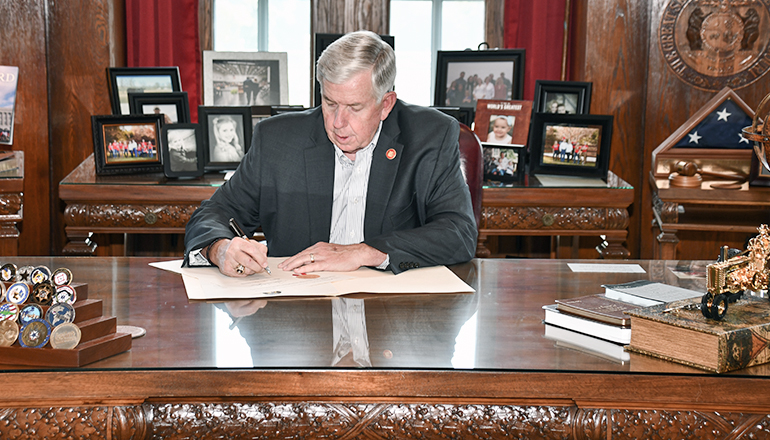Missouri Governor Mike Parson has announced a new executive order aimed at prohibiting the manufacture, sale, and delivery of foods containing psychoactive cannabis products within the state. Executive Order 24-10, issued on Aug. 1, mandates that such products can only be sold if they originate from an “approved source.” The order comes amid growing concerns over the health impacts of these substances, particularly among young residents.
The Missouri Department of Health and Senior Services (DHSS) is actively working to educate retailers and wholesalers who might be affected by this order. Starting Sept. 1, 2024, the DHSS plans to begin embargoing and condemning these products to ensure compliance with the new regulations.
Rising Concerns Over Psychoactive Cannabis
Governor Parson’s action follows a marked increase in the availability of products containing psychoactive cannabis and mounting concerns about their potential health effects. Since 2018, Missouri has seen a 600% increase in cannabis poisoning cases involving children aged five and under, leading to emergency room visits or hospitalizations. Additionally, national poison control centers have reported that about 40% of Delta 8, an unregulated intoxicating hemp product, exposure cases involve children.
These psychoactive products remain unregulated and untested in humans, posing significant risks to consumers. Without regulatory oversight, they are often marketed in eye-catching ways to appeal to the public, particularly young consumers. This lack of control raises the risk of poisoning, unintended intoxication, contaminants, and impaired driving, among other health concerns.
Implications of Executive Order 24-10
The new executive order prohibits foods containing psychoactive cannabis products from being manufactured, sold, or delivered in Missouri unless they come from an “approved source.” Currently, neither the U.S. Food and Drug Administration (FDA) nor the State of Missouri recognizes any “approved sources.” As a result, these products are effectively banned from sale in Missouri until a regulatory framework is established by either the FDA or the Missouri General Assembly.
The order does not extend to products governed by the Division of Cannabis Regulation under Article XIV of the Missouri Constitution or those sold by licensed establishments under the same article.
DHSS Director Paula F. Nickelson highlighted the negative impacts of unregulated psychoactive cannabis products, noting that “numerous Missourians have been adversely affected by consuming foods laced with these products. Disturbingly, children in Missouri and across the nation have been hospitalized after ingesting these substances, and this is unacceptable.”
Enforcement Efforts and Future Actions
To bolster enforcement, Executive Order 24-10 also directed the Missouri Division of Alcohol and Tobacco Control (ATC) to file an emergency rule with the Secretary of State’s Office. This rule sought to amend regulations to prohibit the sale of unregulated psychoactive cannabis products by liquor-licensed facilities. However, this emergency rule was rejected by the Secretary of State last week. Despite this setback, the ATC is continuing its efforts to pursue rulemaking on this issue.
The rejection of the emergency rule does not affect the Sept. 1 effective date for the DHSS to begin enforcing the new regulations. Missouri officials remain committed to ensuring public safety and reducing the risks associated with psychoactive cannabis products.


